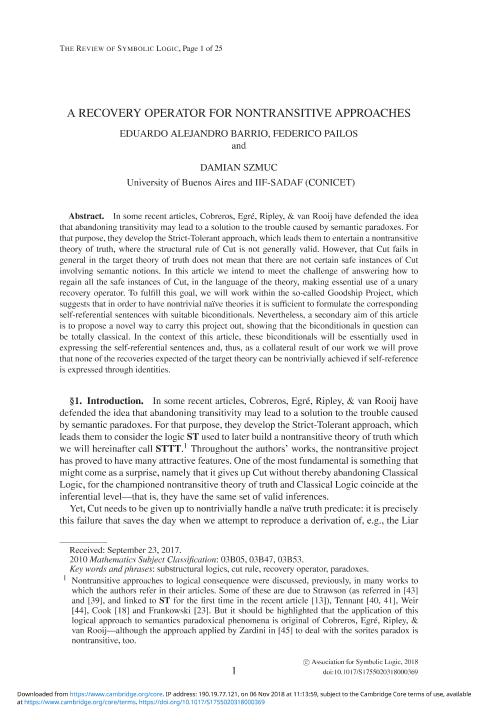Artículo
A recovery operator for non-transitive approaches
Fecha de publicación:
09/2018
Editorial:
Cambridge University Press
Revista:
Review of Symbolic Logic
ISSN:
1755-0203
Idioma:
Inglés
Tipo de recurso:
Artículo publicado
Clasificación temática:
Resumen
In some recent articles, Cobreros, Egré, Ripley, & van Rooij have defended the idea that abandoning transitivity may lead to a solution to the trouble caused by semantic paradoxes. For that purpose, they develop the Strict-Tolerant approach, which leads them to entertain a nontransitive theory of truth, where the structural rule of Cut is not generally valid. However, that Cut fails in general in the target theory of truth does not mean that there are not certain safe instances of Cut involving semantic notions. In this article we intend to meet the challenge of answering how to regain all the safe instances of Cut, in the language of the theory, making essential use of a unary recovery operator. To fulfill this goal, we will work within the so-called Goodship Project, which suggests that in order to have nontrivial naïve theories it is sufficient to formulate the corresponding self-referential sentences with suitable biconditionals. Nevertheless, a secondary aim of this article is to propose a novel way to carry this project out, showing that the biconditionals in question can be totally classical. In the context of this article, these biconditionals will be essentially used in expressing the self-referential sentences and, thus, as a collateral result of our work we will prove that none of the recoveries expected of the target theory can be nontrivially achieved if self-reference is expressed through identities.
Palabras clave:
SUBSTRUCTURAL LOGICS
,
CUT RULE
,
RECOVERY OPERATOR
,
PARADOXES
Archivos asociados
Licencia
Identificadores
Colecciones
Articulos(IIF)
Articulos de INSTITUTO DE INVESTIGACIONES FILOSOFICAS
Articulos de INSTITUTO DE INVESTIGACIONES FILOSOFICAS
Citación
Barrio, Eduardo Alejandro; Pailos, Federico Matias; Szmuc, Damián Enrique; A recovery operator for non-transitive approaches; Cambridge University Press; Review of Symbolic Logic; 9-2018
Compartir
Altmétricas




